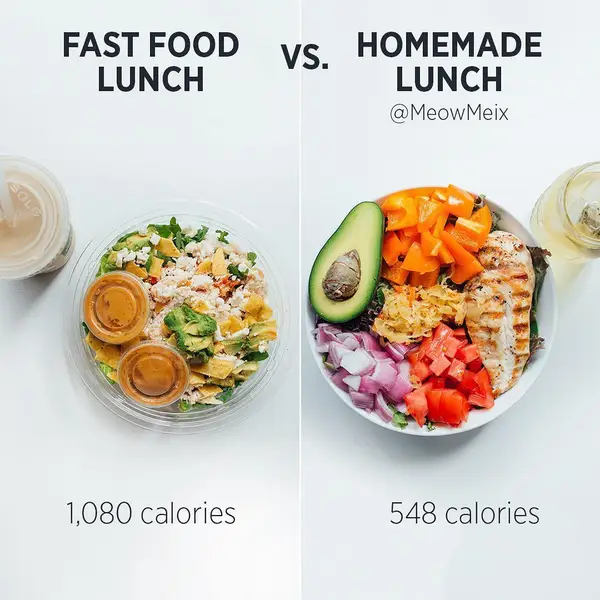Unveiling the Nutritional Divide: Fast Food, Restaurant Food, Home Cooking, and Meal Prep Companies Compared
Unveiling the Nutritional Divide: Fast Food, Restaurant Food, Home Cooking, and Meal Prep Companies Compared

In today’s fast-paced world, finding convenient and time-efficient ways to satisfy our hunger is a top priority. Fast food, restaurant dining, home cooking, and meal prep companies all offer distinct options for fulfilling our dietary needs. However, when it comes to the nutritional value of these choices, significant differences emerge. In this article, we will explore and compare the average amounts of calories, sodium, seed oils, and refined carbohydrates found in fast food, restaurant food, home-cooked meals, and meals from meal prep companies.
- Fast Food:
Fast food establishments have long been associated with convenience, speed, and affordability. Unfortunately, they are also known for offering calorie-dense, sodium-laden, and nutrient-poor options. Many fast food meals contain excessive amounts of refined carbs, unhealthy seed oils, and added sugars. These factors contribute to concerns such as weight gain, high blood pressure, and increased risk of chronic diseases.
- Restaurant Food:
Restaurant dining provides a wider range of culinary experiences, often with greater attention to flavor and presentation. However, the nutritional content of restaurant meals can vary widely depending on the establishment and the choices made by diners. While some restaurants prioritize quality ingredients and healthier cooking methods, others may rely heavily on excessive salt, refined carbohydrates, and unhealthy oils. Caloric content in restaurant meals can also be higher than expected due to larger portion sizes and hidden ingredients like added sugars.
- Home Cooking:
Preparing meals at home allows for complete control over the ingredients, cooking methods, and portion sizes. This control translates into an opportunity to prioritize health and nutrition. Home-cooked meals can be tailored to individual dietary needs, incorporating fresh ingredients, lean proteins, whole grains, and a variety of fruits and vegetables. This approach generally results in lower calorie counts, reduced sodium levels, healthier fats, and fewer refined carbohydrates compared to fast food and some restaurant meals. Home cooking also offers the flexibility to experiment with flavors and adapt recipes to personal preferences.
- Meal Prep Companies:
Meal prep companies have gained popularity in recent years by providing pre-portioned, ready-to-eat meals delivered to your doorstep. These services aim to offer convenience without compromising on nutrition. By sourcing quality ingredients, focusing on portion control, and providing balanced meals, meal prep companies aim to meet the needs of health-conscious consumers. This approach often results in meals with controlled calorie counts, reduced sodium, minimal seed oils, and lower amounts of refined carbohydrates. Meal prep companies typically offer a variety of dietary options, catering to specific needs such as vegetarian, vegan, or gluten-free diets.
Conclusion:
When it comes to the nutritional content of our meals, the choices we make can have a significant impact on our overall health and well-being. While fast food and some restaurant meals tend to be higher in calories, sodium, seed oils, and refined carbohydrates, home-cooked meals and those offered by meal prep companies offer healthier alternatives. By prioritizing fresh ingredients, balanced nutrition, and mindful cooking practices, we can make informed choices that promote a healthier lifestyle.
While convenience plays a role in our dietary decisions, it is essential to consider the long-term effects on our health. Striving for a balance between convenience and nutrition is crucial, and choosing options that prioritize our well-being can lead to improved overall health and vitality.
In the end, the choice is yours. Whether it’s opting for healthier fast food alternatives, exploring restaurants with nutritious offerings, embracing the joys of home cooking, or relying on meal prep companies, making conscious decisions about what we consume can make a world of difference in our quest for a healthier and happier life.


